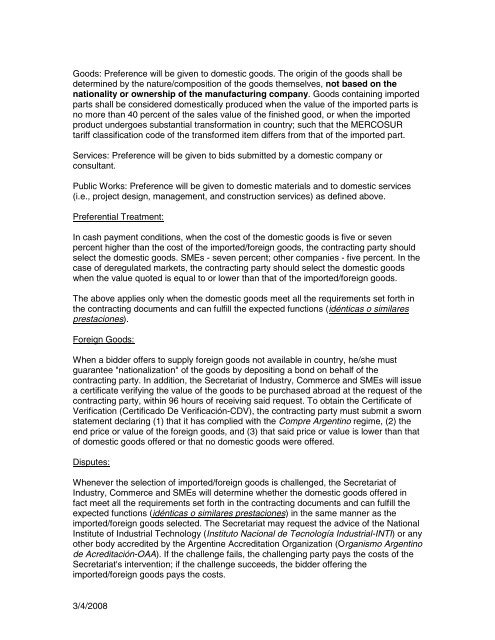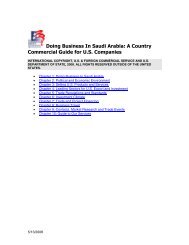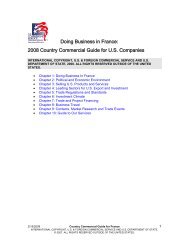Create successful ePaper yourself
Turn your PDF publications into a flip-book with our unique Google optimized e-Paper software.
Goods: Preference will be given to domestic goods. The origin of the goods shall be<br />
determined by the nature/composition of the goods themselves, not based on the<br />
nationality or ownership of the manufacturing company. Goods containing imported<br />
parts shall be considered domestically produced when the value of the imported parts is<br />
no more than 40 percent of the sales value of the finished good, or when the imported<br />
product undergoes substantial transformation in country; such that the MERCOSUR<br />
tariff classification code of the transformed item differs from that of the imported part.<br />
Services: Preference will be given to bids submitted by a domestic company or<br />
consultant.<br />
Public Works: Preference will be given to domestic materials and to domestic services<br />
(i.e., project design, management, and construction services) as defined above.<br />
Preferential Treatment:<br />
<strong>In</strong> cash payment conditions, when the cost of the domestic goods is five or seven<br />
percent higher than the cost of the imported/foreign goods, the contracting party should<br />
select the domestic goods. SMEs - seven percent; other companies - five percent. <strong>In</strong> the<br />
case of deregulated markets, the contracting party should select the domestic goods<br />
when the value quoted is equal to or lower than that of the imported/foreign goods.<br />
The above applies only when the domestic goods meet all the requirements set forth in<br />
the contracting documents and can fulfill the expected functions (idénticas o similares<br />
prestaciones).<br />
Foreign Goods:<br />
When a bidder offers to supply foreign goods not available in country, he/she must<br />
guarantee "nationalization" of the goods by depositing a bond on behalf of the<br />
contracting party. <strong>In</strong> addition, the Secretariat of <strong>In</strong>dustry, Commerce and SMEs will issue<br />
a certificate verifying the value of the goods to be purchased abroad at the request of the<br />
contracting party, within 96 hours of receiving said request. To obtain the Certificate of<br />
Verification (Certificado De Verificación-CDV), the contracting party must submit a sworn<br />
statement declaring (1) that it has complied with the Compre Argentino regime, (2) the<br />
end price or value of the foreign goods, and (3) that said price or value is lower than that<br />
of domestic goods offered or that no domestic goods were offered.<br />
Disputes:<br />
Whenever the selection of imported/foreign goods is challenged, the Secretariat of<br />
<strong>In</strong>dustry, Commerce and SMEs will determine whether the domestic goods offered in<br />
fact meet all the requirements set forth in the contracting documents and can fulfill the<br />
expected functions (idénticas o similares prestaciones) in the same manner as the<br />
imported/foreign goods selected. The Secretariat may request the advice of the National<br />
<strong>In</strong>stitute of <strong>In</strong>dustrial Technology (<strong>In</strong>stituto Nacional de Tecnología <strong>In</strong>dustrial-INTI) or any<br />
other body accredited by the Argentine Accreditation Organization (Organismo Argentino<br />
de Acreditación-OAA). If the challenge fails, the challenging party pays the costs of the<br />
Secretariat's intervention; if the challenge succeeds, the bidder offering the<br />
imported/foreign goods pays the costs.<br />
3/4/2008












